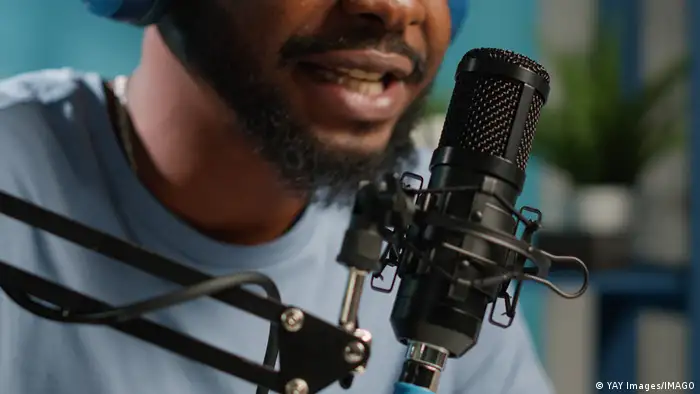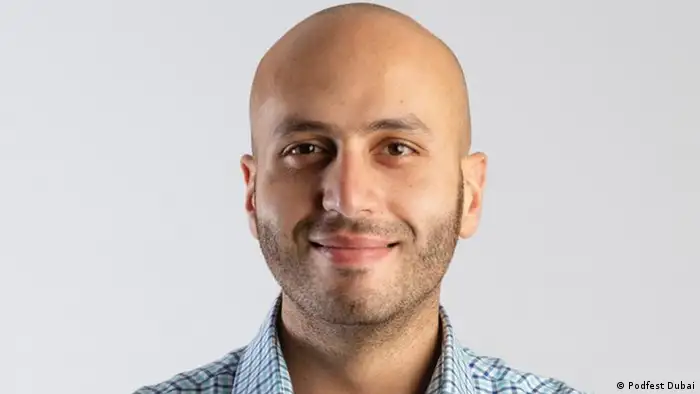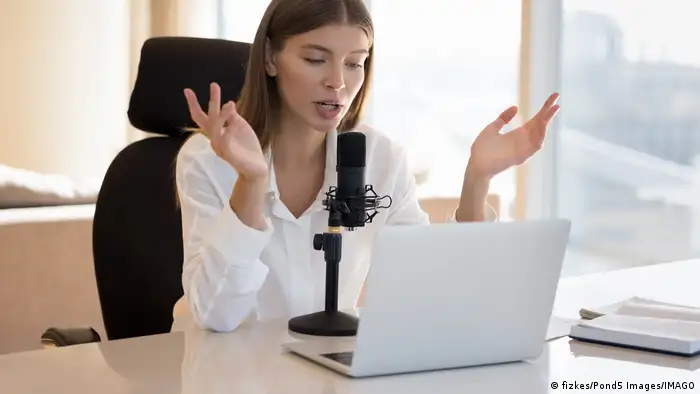Podcasting
Mics and money: Basim Dawood talks monetization strategies for your podcast
Monetizing podcasts can be a big challenge. Basim Dawood, business development manager at one of the Middle East’s leading podcast producers, Sowt, shares insights on generating revenue even if you’re just starting out.
Basim Dawood thinks a lot about podcast monetization, that’s his job. He’s the Business Development Manager at Sowt, a podcast platform that provides audio content in Arabic. Basim figures out how to fund the operation by looking for new leads and coming up with new monetization ideas.
Sowt, which means “voice” in Arabic, curates and produces podcasts on political, social and cultural topics. It started off in 2013 as a social audio platform, like Clubhouse. But in 2016, Sowt changed course and became a podcast production studio. Back then, there were only a handful of people at the organization. Today, there are 29 full-time employees and they’ve just made two new hires. They produce their own podcasts as well as offer production services to NGOs, corporate clients and media organizations. In 2020, Sowt signed an agreement to produce a podcast for Al Jazeera.
Basim started at Sowt in 2021 as a grant writer, the organization’s primary source of income in the early days. But he started taking on more responsibility as the organization sought to continue growing their revenue streams and moving beyond the grant model. Today, Sowt’s has a mixed revenue model made up of grants, production services, training workshops and consulting services.
DW Akademie: There have been studies and conferences out over the past few years that show big growth in podcasting in the Middle East and predict even more. What do you see happening there and why do you think it’s happening?
Basim Dawood: Most of the data suggests that the largest three markets (in the Middle East) are Saudi Arabia, Egypt and the UAE, respectively. During COVID we witnessed a tremendous spike in numbers and demand. And then people just started talking about podcasts. This year, for example, I’ve witnessed a huge number of podcasts coming out of Egypt. And now state-controlled media, corporations and organizations produce their own podcasts. I believe there are a number of reasons for it. Censorship is one. It’s a medium not completely controlled by governments for now. It's a platform for free speech. And every single day, you've got a new show coming out. The challenge is how to monetize and translate these growing numbers into money.
Speaking of money, when should producers in the development process start thinking about monetization strategies?
As soon as you start thinking about creating a podcast, you have to factor in monetization. Yes, producing podcast is relatively cheap in comparison to other media. However, if you're not generating any income out of it, you won’t be able to remain consistent, you won’t stay dedicated. And eventually, you'll find something else to do. We've seen a lot of very talented and skilled podcasters who have had to prioritize full-time jobs or something else that generates income, so they disregard their podcasts.
You also have to keep in mind, what's your ultimate objective? Do you want to become profitable? Do you want to generate millions of dollars? Do you want to cover your direct costs and production costs only? Or do you want to make a living out of it? For us as a company, of course, we want to remain profitable because we would like to become financially sustainable. We would like to receive fewer grants and rely more on scalable revenue streams. Typically, when I talk to clients or individuals, I tell them to come up with like a one-pager where they write down their objectives, motivation, target audience and beneficiaries. It’s a guiding document that will give you the answers to many questions.
What would you suggest then for people who are just starting out?
If the idea is to produce your own content, I would start thinking about grants as a first step. There are a ton of grants out there that individuals and organizations can benefit from. I would go to any of the well-known donors and apply for a grant to cover one season or a couple of episodes, it really depends. It’s a way to get started. There is a great organization called the Global Forum for Media Development, GFMD. I always encourage people to keep an eye on GFMD. Another idea is to map out who the donors are out there and just reach out to them and pitch your idea.
Let's say you're an individual interested in applying for grants. Do you need to have a couple of episodes under your belt and data on downloads you can show? Or can you just say: this is what I'm planning, can you fund it?
It definitely helps having some sort of track record and numbers and data that can validate your arguments. The more inputs you have, the more data, the stronger your case. Keep in mind that some donors might just like the idea and be willing to invest in something that's not yet produced. But I would say start with affordable equipment, record a couple of episodes in your closet, and get it out there. Create some buzz and talk about it so you can get some numbers to showcase. And with grants, you always have to show the donors how you’re going to spend the money: so-and-so amount on production, X amount on equipment, marketing, hosting fees, etc.
So you have to break it down. Any other challenges around grants?
Sometimes you lose focus, sometimes you want to shift your priorities and objectives just to fit within a certain grantmaking scheme or do whatever it takes to get that grant. It’s a tension between remaining consistent and true to your own objectives and goals and at the same time meeting the grant requirements.
What about audience size? Do you need to have a big audience?
I don't think this is the major factor because to reach a larger number of people, you need to have some sort of money to spend on marketing, hiring a community manager or communications manager. I would say the core issue is always around the content and how it’s relevant to the donors and their objectives.
I think a lot of people, when thinking about monetization, immediately think ads and sponsorships since we hear them so often in podcasts. But maybe that’s not always the best way to go at first.
Well, this is when you have to get really concerned with data, audience reach and engagement, because the first thing a potential sponsor or an advertiser will ask you is how many people listen to your podcast and how often do you publish. These things are more important to advertisers than they are to donors, I would say.
But before going into sponsorships and advertising, if you’re starting out, offering services is an option. If I'm a podcast host, producer or sound engineer, I can freelance. There are many projects and podcasts out there willing to hire freelancers since it’s much cheaper than commissioning production companies or studios. Delivering workshops is another option. There's a huge demand out there for workshops. If you’re a skilled writer, host, voiceover performer or sound designer you can definitely find an interested audience for a workshop.
Let’s say you've got some decent numbers behind you. How do you go about finding potential sponsors and advertisers?
There are multiple types of podcast advertising. There's what we call programmatic advertising. Let's say I host my podcast on one of the servers, Acast or Omny or Megaphone. They can help you monetize by running programmatic ad campaigns. Big corporates like Pepsi, BMW and Mercedes would go to the servers, they wouldn't go to individuals. And they will want to run a campaign to get a million downloads a week or a month. The servers would find the relevant podcasts reaching the relevant audiences. And then they would just run the campaign, inserting an ad in your podcast. You don't control them. If it’s a host-read ad, a company would come to you and say they’re willing to sponsor a podcast episode for a certain amount, and you just have to record yourself talking about the brand and insert it somewhere in the episode. That we call dynamic advertising. You have the control.
It seems fairly unlikely that a company will come to you if you’re not very established and say they want to support you?
It's a major challenge. At Sowt we’ve gone to advertising agencies and we're doing much better than before. But it’s still not enough. Some people and companies hire ad sales individuals. We did that this year. They prepare a pretty decent professional slide deck about our work that has a lot of data, case studies, audience data and so on. They go and present that to agencies and potential advertisers.
So you’ve starting down that road. But Sowt is still mostly reliant on grants and services, right?
Yes, and here I’d like to talk a little bit about scalability. If I'm a producer or studio, I can start with grants and then services that I sell to clients. However, it will be really difficult to generate profit from these two approaches, right? They're not scalable. You cannot make a profit out of grants, you can only cover your costs. With services, once you start factoring in a profit margin and the contingency, the cost becomes quite high for clients. For us, in the next two to four years we would like to generate much more income from ad sales and subscriptions. These are two of the most sustainable revenue streams for podcasters.
What do you do when people start feeling discouraged? Perhaps they’ve got the passion, but the money is just not coming in?
It's not easy. I really salute those who continue doing it despite the financial challenges. But like anything else it needs consistency, and it needs someone who's willing to fight to get what they want. But it's okay if you take a break for a while if you’re exhausted from putting weekly or bi-weekly podcast episodes out there. Give yourself a break, maybe readjust your publishing frequency. And if you're not able to monetize on your own, maybe try to find a partner to help you monetize. You can go to one of the production companies or studios and pitch them your idea. Discuss collaborating with them. You can go to one of the bigger podcast production networks, pitch them an idea and then they can sort of incubate it into their network and pay you for it.
DW recommends
- Date 02.04.2024
- Author Kyle James (interview)
- Feedback: Send us your feedback.
- Print Print this page
- Permalink https://p.dw.com/p/4eMEh
- Date 02.04.2024
- Author Kyle James (interview)
- Send us your feedback.
- Print Print this page
- Permalink https://p.dw.com/p/4eMEh



